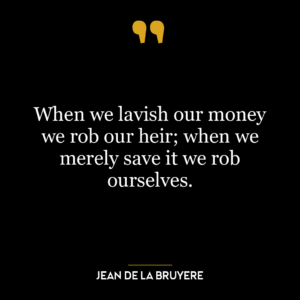This quote suggests that both extremes of the financial spectrum, immense wealth and extreme poverty, can lead to criminal activities driven by money. On one hand, great poverty can lead individuals to commit crimes out of desperation, in order to survive or to provide for their families. On the other hand, great wealth can also lead to money-crimes as individuals might resort to illegal means to maintain or increase their wealth, driven by greed or fear of losing their affluent status.
From a societal perspective, this quote underscores the importance of a balanced wealth distribution. If the gap between the rich and the poor is too wide, it could potentially lead to an increase in crime rates. This is relevant in today’s world where economic inequality is a significant issue in many societies. Policies that aim to reduce this inequality, such as progressive taxation or increased access to quality education, could therefore contribute to reducing money-related crimes.
In terms of personal development, this quote serves as a reminder of the potential pitfalls of both poverty and wealth. It encourages individuals to strive for financial stability, rather than extreme wealth, and to be aware of the potential ethical compromises that might come with financial desperation or greed. It also emphasizes the importance of maintaining one’s moral compass, regardless of one’s financial situation.
Furthermore, it suggests that wealth and poverty are not merely economic states, but also states of mind that can influence our behaviors. Therefore, cultivating a mindset of contentment and ethical integrity, regardless of our financial circumstances, can help us avoid the negative behaviors associated with both extremes of the wealth spectrum.







